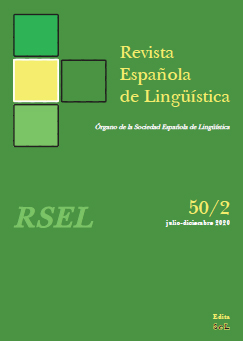Passives of psychological verbs with experiencer subjects
https://dx.doi.org/10.31810/RSEL.50.2.7
Keywords:
Adjectival passive; verbal passive; state; event; psychological verb; ser and estar; individual level and stage level.Abstract
In the recent literature, it is widely assumed that adjectival passives are stative, while verbal passives are eventive. Regarding Spanish, it is also mostly assumed that adjectival passives only come with estar (El edificio está bien construido, «The building is well built»), while verbal passives only come with ser (El edificio ya ha sido construido, «The building has already been built»). However, there is at least a group of verbs, that of subject experiencer psych verbs (SPEVs), which poses a serious problem to these generalizations, given that passives of SEPVs, although being unquestionably stative, are constructed with ser: Pedro es temido, «Pedro is feared». In this paper it is argued, that SEPV passives are not verbal, but adjectival, and that they take ser because they denote individual-level states.
Downloads
References
Arche, M. J. (2006): Individuals in time, Ámsterdam, John Benjamins.
–, Fábregas, A. y Marín, R. (2017): «Towards a unified treatment of Spanish copulas», en Perpiñán, S. y otros (eds.), Romance languages and linguistic theory 11. Selected papers from the 44th Linguistic Symposium on Romance Languages (LSRL), Ámsterdam, John Benjamis, pp. 33-52.
Berro, A. (2019): «Non-verbal participles in Basque and Spanish», en Berro, A., Fernández, B. y Ortiz de Urbina, J. (eds.), Basque and Romance. Aligning grammars, Leiden/Boston, Brill, pp. 82-138.
Bosque, I. (1989): Las categorías gramaticales. Relaciones y diferencias, Madrid, Síntesis.
–, (1990): «Sobre el aspecto en los adjetivos y en los participios», en Bosque, I. (ed.), Tiempo y aspecto en español, Madrid, Cátedra, pp. 177-214.
–, (1999): «El sintagma adjetival. Modificadores y complementos del adjetivo. Adjetivo y participio», en Bosque, I. y Demonte, V. (dirs.), Gramática descriptiva de la lengua española, Vol. I, Madrid, Espasa, pp. 217-230.
–, (2014): «On Resultative past participles in Spanish», Catalan journal of linguistics 13, pp. 41-77.
Brucart, J. M. (2010): «La alternancia ser/estar y las construcciones atributivas de localización», en Avellana, A. (comp.), Actas del V Encuentro de Gramática Generativa, Neuquén, Editorial Universitaria del Comahue, pp. 115-152.
Carlson, Gregory N. (1977): Reference to kinds in English, Tesis doctoral, Universidad de Massachussets.
Coussé, E. (2011): «On ambiguous past participles in Dutch», Linguistics 49, 3, pp. 611-634.
De Miguel, E. (1992): El aspecto en la sintaxis del español: perfectividad e impersonalidad, Madrid, Universidad Autónoma de Madrid.
Embick, D. (2004): «On the structure of resultative participles in English», Linguistic inquiry 35, pp. 355-392.
Fábregas, A. (2016): Las nominalizaciones, Madrid, Visor.
–, y Marín, R. (2015): «Deriving individual-level and stage-level psych verbs in Spanish», The linguistic review 32, 2, pp. 167-215.
–, Leferman, B. y Marín, R. (2013): «Evaluative adjectives are Davidsonian states», Proceedings of Sinn und Bedeutung 17, París, pp. 237-253.
García-Pardo, A. (2017): «Aspect and argument structure in adjectival passives», Borealis 6, 1, pp. 21-52.
Gehrke, B. y Marco, C. (2014): «Different by-phrases with adjectival and verbal passives: Evidence from Spanish corpus data», Lingua 149, pp. 188-214.
–, (2015): «Las pasivas psicológicas», en Marín, R. (ed.), Los predicados psicológicos, Madrid, Visor, pp. 117-157.
Gibert-Sotelo, E. (2017): Source and negative prefixes: On the syntax-lexicon interface and the encoding of spatial relations, Tesis Doctoral, Universitat de Girona. http://hdl.handle.net/10803/461414
Gibert-Sotelo, E. (2019): «Entre verbo y adjetivo, clasificación y análisis de los participios pasivos adjetivales», XLVIII Simposio Internacional de la Sociedad Española de Lingüística (29 de enero - 1 de febrero de 2019), Madrid, CCHS-CSIC.
Levin, B., y Rappaport, M. (1986): «The formation of adjectival passives», Linguistic inquiry 17, pp. 623-661.
Luján, M. (1981): «The Spanish copulas as aspectual indicators», Lingua 54, pp. 165-210.
Marín, R. (1997): «Participios con aspecto de adjetivos: entre la diacronía y la morfología», Moenia 3, pp. 365-376.
–, (2001): El componente aspectual de la predicación, Tesis doctoral, Bellaterra, Universitat Autònoma de Barcelona.
–, (2004): «Sobre pasivas adjetivales», Verba 31, pp. 455-471.
–, (2009): «Del participio al adjetivo», en De Miguel, E. y otros (eds), Fronteras de un diccionario: las palabras en movimiento, San Millán de la Cogolla, Cilengua, pp. 327-348.
–, (2010): «Spanish adjectives within bounds», en Cabredo, P. y Matushansky, O. (eds.), Adjectives: Formal analysis in syntax and semantics, Ámsterdam, John Benjamins, pp. 307-331.
–, (2016): «Ser y estar», en Gutiérrez-Rexach, J. (ed.), Enciclopedia de Lingüística Hispánica, Londres, Routledge, pp. 13-24.
–, y McNally, L. (2011): «Inchoativity, change of state, and telicity: Evidence from Spanish reflexive psychological verbs», Natural language and linguistic theory 29, pp. 467-502.
Mendikoetxea, A. (1999): «Construcciones inacusativas y pasivas», en Bosque, I. y Demonte, V. (dirs.), Gramática descriptiva de la lengua española, Vol. II, Madrid, Espasa, pp. 1575-1629.
McIntyre, A. (2013): «Adjectival passives and adjectival participles in English», en Alexiadou A. y Schäfer, F. (eds), Non-canonical passives, Ámsterdam, John Benjamins, pp. 21-42.
Morimoto, Y. y Pavón, M. V. (2007): Los verbos pseudo-copulativos del español, Madrid, Arco/Libros.
Perpiñán, S., Marín, R. y Moreno, I. (2020), «The role of aspect in the acquisition of ser and estar in locative contexts by English-speaking learners of Spanish», Language acquisition 27, 1, pp. 35-67.
Porroche, M. (1988): Ser, estar y verbos de cambio, Madrid, Arco/Libros.
Ramchand, G. (2008): Verb meaning and the Lexicon: A first phase syntax, Cambridge, Cambridge University Press.
Wasow, T. (1977): «Transformations and the Lexicon», en Culicover, P. (ed.), Formal syntax, Nueva York, Academic Press, pp. 327-360.
Published
How to Cite
Issue
Section
Copyright (c) 2020 Revista Española de Lingüística

This work is licensed under a Creative Commons Attribution-NonCommercial 4.0 International License.






